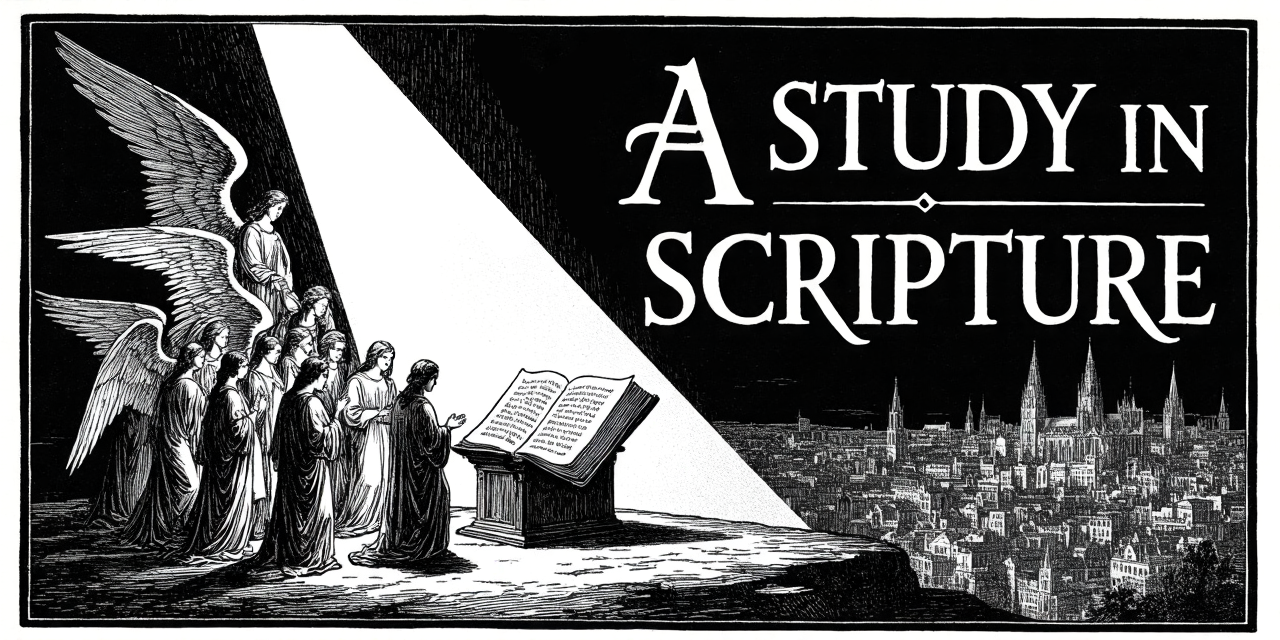
DRAFT ARTICLE
In the interests of transparency, New Quaker Ministries drafts all of it’s articles in the open. We are a non-profit, independent ministry, funded entirely through small individual donations and contributions. While an article is in DRAFT, it is unfinished and is likely inaccurate. Accuracy will be built overtime while the article is being drafted. We do not use AI to draft articles. Our articles are the results of intense focused independent research based on critical exegesis, the historical method, the scientific method, and verifiable, published, and peer-reviewed archaeology. We take our time when drafting these articles and are extremely methodical in our approach so sometimes articles can stay in DRAFT for several weeks as they are being constructed. Before the article is removed from DRAFT status, we will fact check and cross reference everything stated, and provide a robust bibligoraphy, so that you can verify our claims.
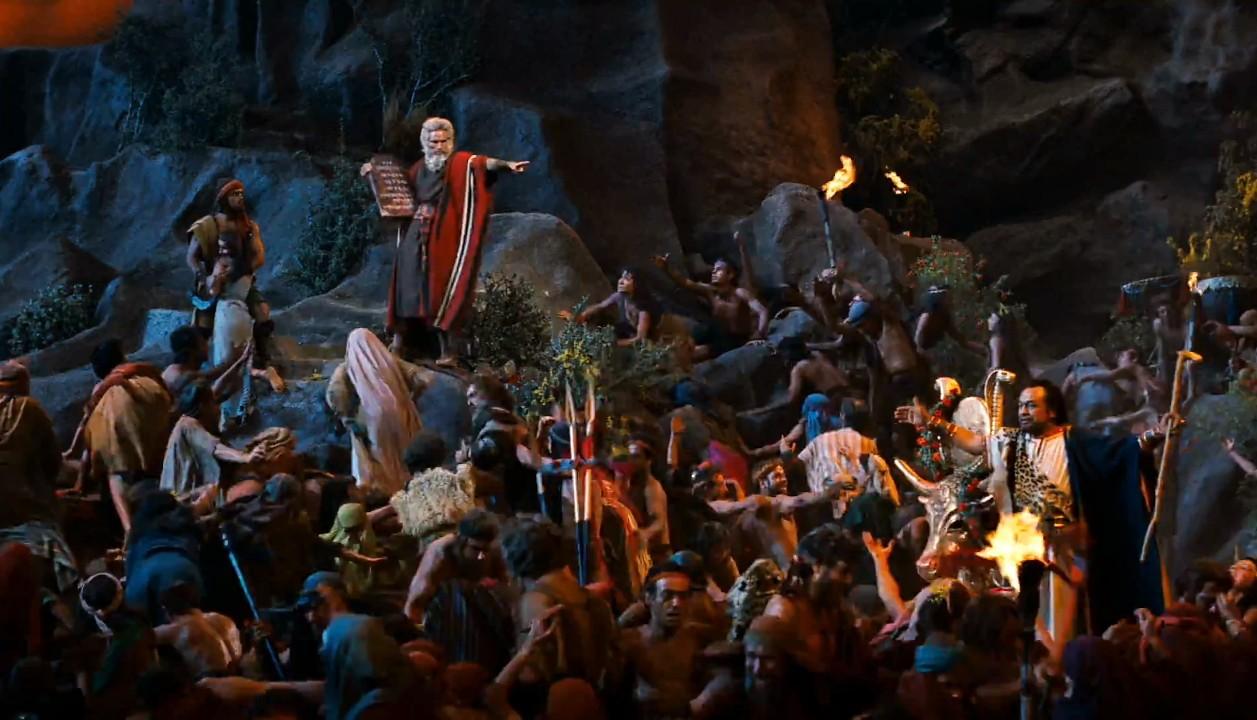
As you may remember from the famous Charlton Heston movie, the Jewish people were once captured and enslaved by Pharoah before being led out of Egypt by the Prophet Moses. We call this time period The Exodus and it is from this time that Biblical Law is established by Moses. This law was recorded into the Hebrew Bible as The Covenant Code, The 10 Commandments (the “Decalogue”), the Book of the Covenant, the Book of Leviticus, the Book of Numbers, and the Book of Dueteronomy. From here on out, we will refer to these laws as the Mosaic Law. The word “Mosaic” meaning “coming from Moses”.
The Mosaic Law is very clear as it relates to immigrants, and the treatment thereof. In Exodus 22:21-24 it says:
“You shall not wrong or oppress a resident alien, for you were aliens in the land of Egypt. You shall not abuse any widow or orphan. If you do abuse them, when they cry out to me, I will surely heed their cry; my wrath will burn, and I will kill you with the sword, and your wives shall become widows and your children orphans."
In Exodus 23:9, again it states:
“You shall not oppress a resident alien; you know the heart of an alien, for you were aliens in the land of Egypt.”
In Levitcus 19:33 it states:
When an alien resides with you in your land, you shall not oppress the alien.
And we see it once again in Deuteronomy 10:17-20, where it says:
For the Lord your God is God of gods and Lord of lords, the great God, mighty and awesome, who is not partial and takes no bribe, who executes justice for the orphan and the widow, and who loves the strangers, providing them food and clothing. You shall also love the stranger, for you were strangers in the land of Egypt.
The Biblical Laws of Moses are very clear:
>>> Oppressing immigrants is a sin. <<<
But why is this so? Why is it a sin to oppress immigrants? #
To understand why it is a sin to oppress immigrants, you must first understand the history of Israel.
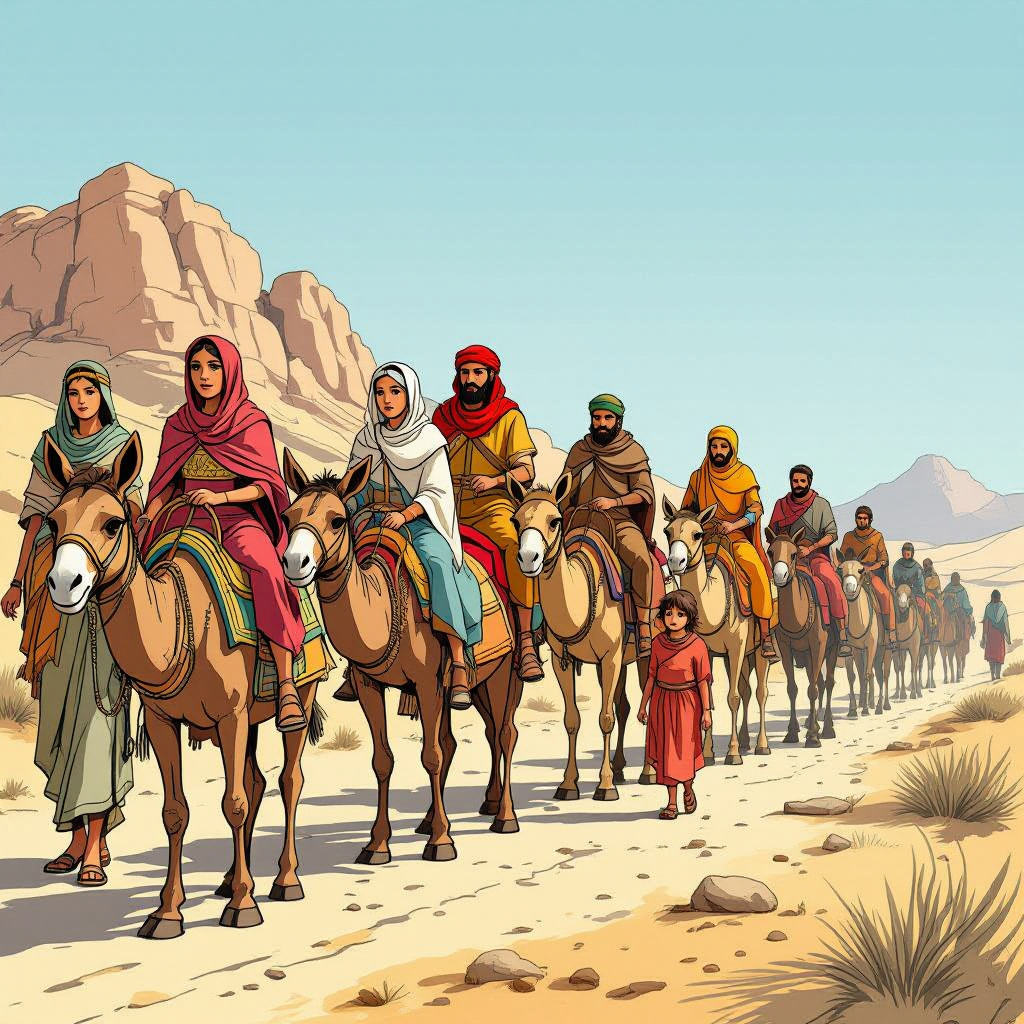
Before the Israelites, there were the Hebrews (who became Israelites), and before the Hebrews there were the Cannanites. The Cannanites include a wide variety of different pastoral nomadic tribes and polities. There is still some debate where the borders of ancient Cannan extended, but most modern scholars agree that it includes the lands of modern day Israel, Palestine, Lebanon, as well as parts of Jordan, Syria and Egypt. Many scholars believe the city state of Ugarit was Canannite, however other records indicate that people living in Ugarit did not consider themselves as part of Cannan. There are some records that indicate that the lands of Kizzuwatna (modern day Adana, ancient Denyen, also associated with the Tribe of Dan) were considered Cannanite by some, however were quickly vassalized under Hittite control and did not consider themselves to be Cannanite.
Achaeological DNA investigations has shown that the lands of Canaan were settled by the pastoral nomads who lived in that area, and by the peoples from the Zagros Mountains in modern day Iran. The story of Abram’s travels to the land of Canaan from Uruk (modern day Iraq) follows this same migration pattern by following the Euphrates River toward Harran and then onto places like Ebla (modern day Aleppo, Syria) and Tell Balata (modern day Nablus, Palestine), which is identified with the biblical city of Shechem.
Genesis 12:4-9 says:
So Abram went, as the Lord had told him, and Lot went with him. Abram was seventy-five years old when he departed from Haran. Abram took his wife Sarai and his brother’s son Lot and all the possessions that they had gathered and the persons whom they had acquired in Haran, and they set forth to go to the land of Canaan. When they had come to the land of Canaan, Abram passed through the land to the place at Shechem, to the oak[b] of Moreh. At that time the Canaanites were in the land.
Here is an archaeological map for the time period of around 1760 BCE, showing the various polities at the time. You’ll see they all center on the Euphrates River, and expanded outwards from there. This makes a lot of sense. As people migrate from place to place they need access to running water, pastures, and plant life as well as soils suitable for agriculture. So they followed the rivers, and lakes, and streams.
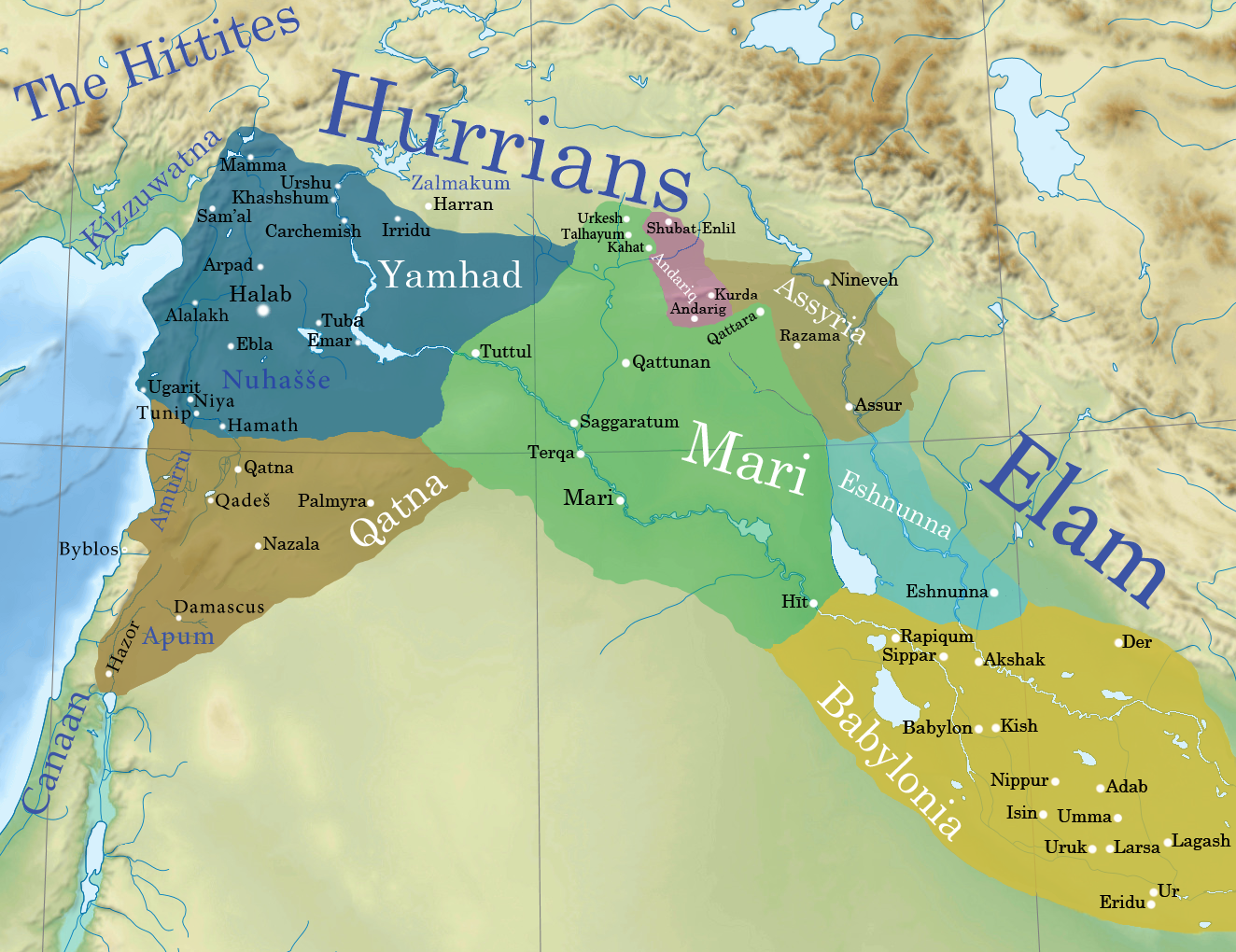
You can see the city of Uruk on the bottom right in the yellow area, Harran near the top center, right about the blue area in the land of the Hurrians, and in the bottom left in the brown you’ll see Hazor. According to Genesis – and thus the oral tradition of the ancient Hebrews – this is roughly the path that Abram took: first starting in Uruk, travelling up the Euphrates to Harran, staying in Harran until the age of 75, and then leaving for Canaan and reaching as far south in Canaan as Shechem, which is even further south of Hazor and is not shown on this map.
Abram comes from Uruk. Every tribe that decends from Abram, and that settled into the lands of Canaan are from Iraq and Iran, originally. The archaeological record supports this, and the Bible supports this in Genesis.
>>> Abram was an immigrant. <<<
So that’s strike #1. But why are the lands of Canaan so important?
First, Canaan is on the frontier of many different empires, and all of those empires have an interest in trade in the medditaranian. If you are a trader or a king in the east (for example if you’re Assyrian, Elamite, or Babylonian) then you want your goods to reach into international trade. So you connect your Empire to a shipping harbor that will give you access to that trade with the Minoans, Sicels, Nuragic Cultures, Mycenean Greeks, Lybians and others in the Meditaranian and west. All the closest harbors, and thus the most accessible and cheapest are in Canaan.
The rise of the Hyksos #
The defeat of the Hyksos (Ahmose I) #
The Battle of Kadesh #
The oldest text we have in the Bible is from 1300 BCE. It is called the “Song of the Sea”, which was shown by Rabbi Joshua Berman that it was an adaptation of the Poem of Pentaur from the Battle of Kadesh (on the Orontes), which took place in 1274 BCE between the Egyptians led by pharoah Ramesses II and the Hittite Empire led by king Muwatalli II.
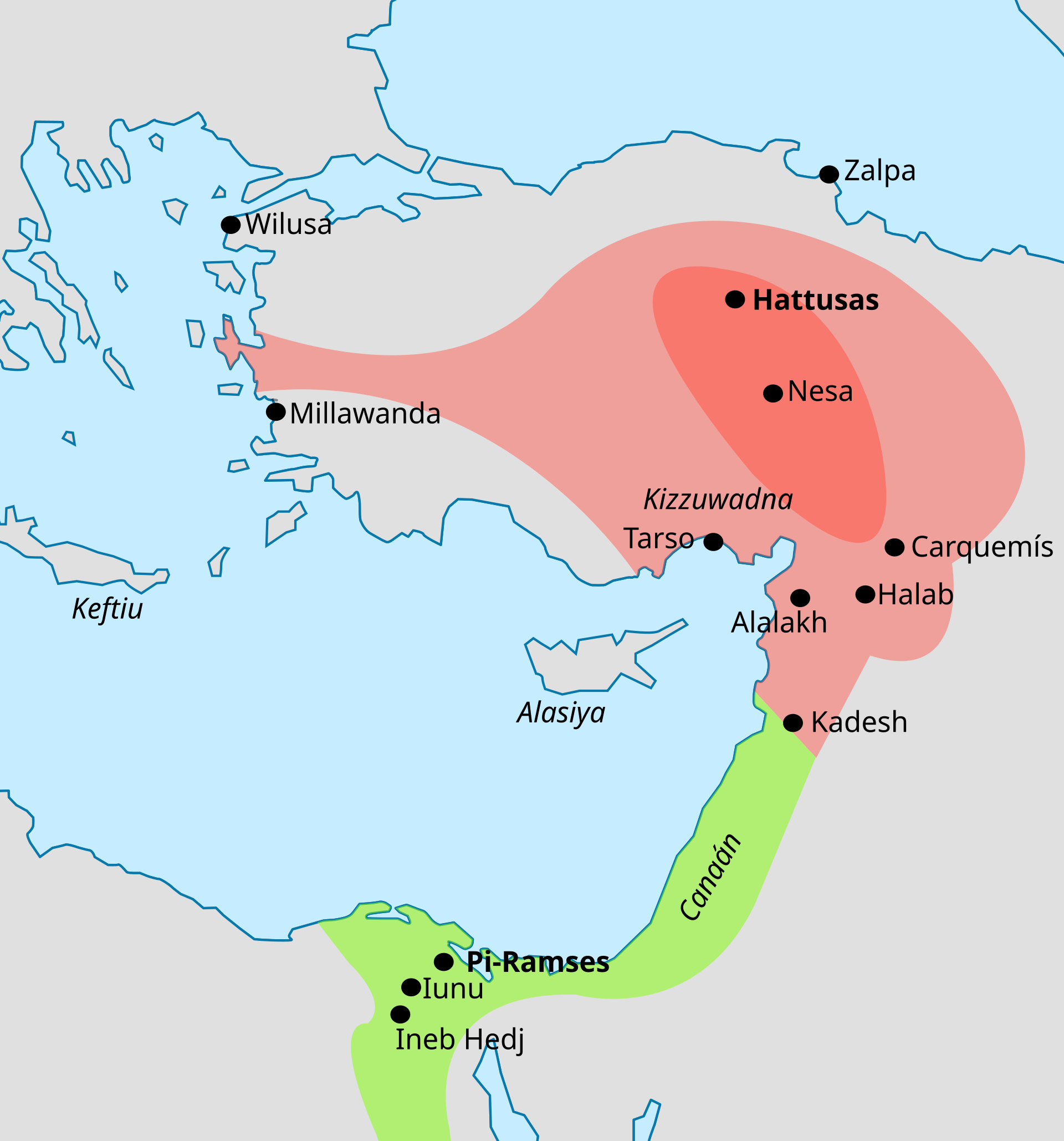
If you take a close look at this map, you’ll see the Hittites in red at the top with the concentration of their power in the dark red near Hattusas – the Hittite capital. The Kingdom of Ramssees II as it existed right before the Battle of Kadesh, is shown in green. You can see from this map that Egypt included the lands of Canaan. Modern day Israel is in the land of Canaan, as is the whole of Palestine, the whole of Lebanon, and parts of Syria, and Egypt.
This is where ancient Kingdom of Israel will begin around 1047 BCE, with the acension of Saul – about 227 years after the Battle of Kadesh.
How the civil war of ancient greeks caused a global world war, and the start of Israel’s history as a nation. #
[Edit note: We’re going to have to talk about the force resettlement of the Sea Peoples]
- Hyksos Rule Egypt (1650 - 1550 BCE) - potential association with Yakob-Har / Jacob of Genesis.
- Ahmose I ejects the Hyksos from Goshen (an area in north-eastern Egypt, on the Nile delta) (1540 BCE)
- Destruction of Troy VI (1300 BCE)
- Mycenean Thebes, in Boetia is burned to the ground. - LHIIIb (1280 BCE)
- Alaksandu of Troy, king of Wilusa signs treaty with Hititte King Muwatalli II (1280 BCE)
- Ramesses II defeats Sherden pirates along Libyian coast. (1277 BCE)
- Ramesses II conscripts Sherden pirates into his personal guard. (1276 BCE)
- Battle of Kadesh - Ramesses II defeats Sherden, Lukka, and Shekelesh fighting alongside Hitittes (1274 BCE)
- Rising Piracy in the Meditaranian, as evidenced by the retraction from the coastlines into fortified inland complexes in Boetia. LHIIIc (1250 BCE)
- A Hititte king requests a Mycenean King (Ahhiyawan) to do something about Piyama-radu who has allied with the Ahhiyawans and led a rebellion in Lukka (southern Anatolia) and attacked coastal cities under Hititte influence. (1250 BCE)
- Canaanite, Gazan, Ascalon, Yenoam, and Israelite revolt, during Merneptah’s rule - Eastern Flank (1208 BCE)
- Libyian revolt with The Nine Bows during Merneptah’s rule - Western Flank (1207 BCE)
- Merneptah Stele is erected mentioning Israel for the first time in recorded history to celebrate Merneptah’s triumph over the “invaders”. (1208 BCE)
- Destruction of Mycenae, and the total collapse of all Mycenean palatial centers. - (1190 BCE)
- Ramesses III defeats an attack by the Libyians on the western frontier of Egypt (1181 BCE)
- Destruction of Pylos due to attack / invasion. - (1180 BCE)
- Destruction of Minyan Orchomenous in Boetia, legend states by a war with neighboring Thebes, but Archaeology shows the site as abandoned. - (1180 BCE)
- Destruction of Troy VIIa (homeric troy) - (1180 BCE)
- Fall of Ugarit - Ammurapi pleads with the king of Cyprus (Alasiya) of the invading Sea Peoples (1180 BC)
- Ramssees III defeats a federation of multiple peoples including the Peleset, Tjekker, Shekelesh, Denyen, and Weshesh at the Battle of Djahy in Southern Lebanon. (1178 BCE)
- Ramesses III defeats a federation of multiple peoples including the Denyen, Peleset, Shekelesh, Sherden, Teresh, Tjekker, and the Weshesh at the Battle of the Delta. (1179-1175 BCE)
The Sea Peoples & Ramesses III resettlement after enslavement and bondage #
| Egyptian | Origins | Resettled by Ramesses III as |
|---|---|---|
| Peleset | Pelesigians (Northern coastline of Greece in the Aegean Sea) | Philistines |
| Denyen | The Adana Peoples (kingdom of Kizzuwatna in Cilicia), probably Mycenean in origin | Tribe of Dan |
| Shekelesh | Sicels from Sicily who fought with the Berber Libyians as priate mercenaries | ??? killed / enslaved |
| Sherden | Nuragic culture of Sardinia | Potentially settled around El-Ahwat in Israel, associated with Sisera and Tel Hazor |
| Teresh | ||
| Tjekker | Trojans | Tel Dor, settled within the lands of the Israelite tribe of Manasseh |
| Weshesh | ||
| Meshwesh | Berbers in Libyia |
Ramesses III bragged about enslaving hundreds of thousands of people. From The Harris Papyrus (1152 BCE) we get the words of Ramesses III directly:
I brought back in great numbers those that my sword has spared, with their hands tied behind their backs before my horses, and their wives and children in tens of thousands, and their livestock in hundreds of thousands. I imprisoned their leaders in fortresses bearing my name, and I added to them chief archers and tribal chiefs, branded and enslaved, tattooed with my name, their wives and children being treated in the same way.
- The Kingdom of Israel is established (1050 BCE)
- The First Books of the Bible (934 BCE)
- The Illiad is Written Down - (800 BCE)
[end edit note]
If you are well-versed in scripture, you probably already know of these rules and commandments and the story of The Exodus, but what you may not know, is that from an archaeological standpoint there are at least two significant periods of time where ancient peoples from the lands of Canaan resided in Egypt. The first is in the 16th century BCE, when the Hyksos ruled lower Egypt on the eastern side of the Nile river in the lands of Goshen near modern day Avaris before these “Shepard Kings” were driven out of Egypt by Ahmose I sometime around 1540 BCE.
The second is in the 11th century BCE, at the end of the Late Bronze Age Collapse when Ramssees III resettled the raiding and migrating “Sea Peoples” that were captured in battle into the lands of Canaan around 1150 BCE.
From the period of Tutmoses III’s reign in the 1430s BCE (after Ahmose I’s until
Why is this significant? Because it shows from both the Biblical narrative, and the secular archaeological narrative that the ancient Hebrews along with other peoples lived as foreigners within Egypt and understood the lived experiences of immigrants.
The ancient Hewbres even ruled lower egypt as foreign “Shepard Kings” before being driven back across a border by the forceful hand of the Pharoah. Later Pharoahs from Tutmoses III (1430s BCE) onwards continually oppressed the peoples of the Levant by engaging in continous cycles of capture, enslavement, and resettlement until Ramssees III’s mass migration of the invading Peleset,in the 1150s.
Their shared history as migrating peoples escaping the collapse of society at the end of the late bronze ages – a time when the mass migrations of people was happening all over the medditaranian – it makes sense that when some of these migrating peoples were forcefully resettled into Canaan by the Pharoahs of Egypt that they might be of the mind that foreigners should be treated with respect.
The ancient Hewbrews understood what it was like to be treated poorly as a foreigner in a land they did not originate from, and that is why from the Exodus onwards Jews and by extension Christians are commanded to treat immigrants and foreigners with the respect and dignity they deserve.
Xenophobia is incompatible with Christianity and with Mosaic Law.
Biblical law requires us to love the immigrant. #
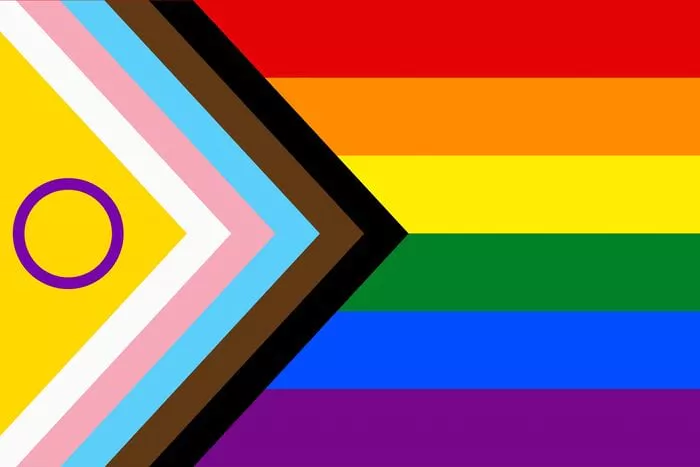
Let me ask you a question. Do you think homosexuality is a sin? If you are a Christian, there is a good chance that you do. It’s against Biblical Law, you’ll say. You’ll probably point to Leviticus and Romans; two very different books of the Bible written at two very different times which both allege that homosexuality is sinful.
In Leviticus 18:22 it states:
“You shall not lie with a male as with a woman; it is an abomination.”
This is the infamous passage that bigots use to attack and denigrate homosexual people. They see it as confirmation that their hate against homosexuals is valid and righteous. Let’s be clear. Regardless of your position on this issue, attacking, bullying, isolating, excluding, and denigrating other people for who they are is not in line with Christ’s teachings. That is called “iniquity” and it itself is a sin. Hatred is itself an abomination. It is wicked to engage in it. It is not your job to judge others.
That said, let’s say for the sake of argument that you are of the mind that we should “hate the sin, but love the sinner”. Although, it is not our place to judge others, we can all agree that judgement is coming for us all. So let me ask you this: Under which system of Biblical Laws would you yourself like to be judged by God?
Did you know there are multiple Biblical Law systems in the Bible? Before there was Jesus, there was the Laws of Moses, which not only included the ten commandments but other laws too. When the Law of Moses came, it reformed the Law of Noah. When the Law of Jesus came, it reformed the Law of Moses. [needs citation]
[needs rework below] If you follow the Laws of Moses, and you judge others on Leviticus which states in Leviticus 18:22 that:
Then by the same law you should judge yourself on immigration which states in Leviticus 19:33:
“When an alien resides with you in your land, you shall not oppress the alien."
Which Law do you follow?
I bet you didn’t know the same biblical laws that says homosexuality is a sin, also says that treating immigrants poorly is a sin! And we’re not even talking about two opposite sides of the Bible taken out of context, that is ONE CHAPTER and ELEVEN VERSES later in the same book of the Bible, under the same context! It should make you think. Shouldn’t it?
So I’ll ask again. Which Law do you follow? The Laws of Moses or Laws of Jesus? Let’s see what Jesus has to say about how we judge others in Matthew 7:3-5.
Why do you see the speck in your neighbor’s eye but do not notice the log in your own eye? Or how can you say to your neighbor, ‘Let me take the speck out of your eye,’ while the log is in your own eye? You hypocrite, first take the log out of your own eye, and then you will see clearly to take the speck out of your neighbor’s eye.
Logs and Specks indeed. We are so quick to judge others under the laws we think they should be judged, but it seems we aren’t too happy about being judged ourselves under that very same law! James and Paul both warn us about the laws that we accept. That we will be judged under the whole of the law. In James 2:8-12 it reads:
If you really fulfill the royal law according to the scripture, “You shall love your neighbor as yourself,” you do well. But if you show partiality, you commit sin and are convicted by the law as transgressors. For whoever keeps the whole law but fails in one point has become accountable for all of it. For the one who said, “You shall not commit adultery,” also said, “You shall not murder.” Now if you do not commit adultery but you murder, you have become a transgressor of the law. So speak and so act as those who are to be judged by the law of liberty.
Which law do you accept and wish to be judged by? It’s your choice! Choose wisely, now! Go on. In Paul’s letter to the Romans in Chapter 2, he says:
Therefore you are without excuse, whoever you are, when you judge others, for in passing judgment on another you condemn yourself, because you, the judge, are doing the very same things. We know that God’s judgment on those who do such things is in accordance with truth. Do you imagine, whoever you are, that when you judge those who do such things and yet do them yourself, you will escape the judgment of God? Or do you despise the riches of his kindness and forbearance and patience? Do you not realize that God’s kindness is meant to lead you to repentance? But by your hard and impenitent heart you are storing up wrath for yourself on the day of wrath, when God’s righteous judgment will be revealed. He will repay according to each one’s deeds: to those who by patiently doing good seek for glory and honor and immortality, he will give eternal life, while for those who are self-seeking and who obey not the truth but injustice, there will be wrath and fury. There will be affliction and distress for everyone who does evil, both the Jew first and the Greek, but glory and honor and peace for everyone who does good, both the Jew first and the Greek. For God shows no partiality.
All who have sinned apart from the law will also perish apart from the law, and all who have sinned under the law will be judged in accordance with the law. For it is not the hearers of the law who are righteous in God’s sight but the doers of the law who will be justified.
Kind of fitting considering the first chapter, don’t you think? Do you think Paul was trying to make a broader point about judging others under the law we ourselves think we are immune to?
It should make you think. If you accept that homosexuality is a sin, and judge others under the laws of Leviticus, then you must also judge those who cause harm to immigrants under those exact same laws. Oppressing immigrants in any way, shape or form – or supporting their oppression is a sin under the Laws of Moses. What is legal under the laws of humans, isn’t always legal under the laws of God.
So I will ask you one last time, which Law do you wish to be judged by?
“When an alien resides with you in your land, you shall not oppress the alien." ~ Leviticus 19:33
I don’t think Moses could have been any clearer. Do you?
The Twelve Curses of Moses #
Covered in Dueteronomy 27:19
- making idols
- dishonoring parents
- moving a property marker (fraud)
- misleads a blind person (taking advantage of a disability)
- Deprive a foreigner, orphan or widow of Justice. (27:19)
- Sleeps with step-mom
- Beastiality
- Incest
- sleeps with mother in law
- hurts a neighbor, secretly (plotting against another)
- takes money to kill another
- does not uphold these laws.
Dueteronomy 28:15-42 #
Notes say this is a based but divine justice hits on 43 and 44.
“Aliens residing among you shall ascend above you higher and higher, while you shall decend lower and lower.”
“They will lend to you, but you shall not lend to them; they shall be the head and you the tail.”
Note: Provers is filled with tons of anti-fascist widsdom that is super relevant. Provers 24:1-2
New Testament #
-
“The Judgement of Nations” in Matthew 25:35 “what you do to the least of these…”
-
“The Good Samaritan” in Luke 10:25-37
-
Galatians 3:28 (pro-non-binary / pro-trans as well)
-
“There is no longer Jew or Greek; there is no longer Slave or free; there is no longer male and female, for all of you are on in Christ Jesus.”
-
Hebrews 13:1-6
“You cannot just standby. You must act.” #
- James 2:14-26 “Faith without works is dead; just as a body without spirit is dead”
